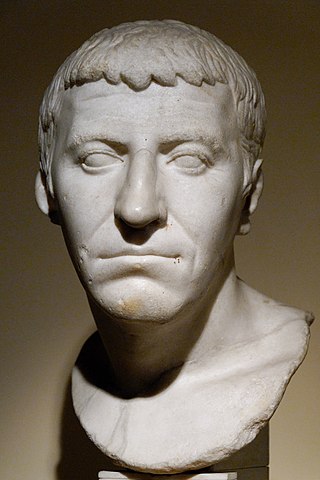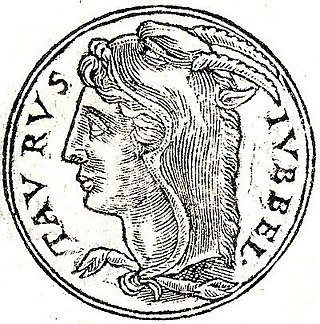Related Research Articles
Gnaeus Domitius Afer was a Roman orator and advocate, born at Nemausus (Nîmes) in Gallia Narbonensis. He flourished in the reigns of Tiberius, Caligula, Claudius and Nero. He was suffect consul in the nundinium of September to December 39 as the colleague of Aulus Didius Gallus.

Gnaeus Domitius Corbulo was a popular Roman general, brother-in-law of the emperor Caligula and father-in-law of Domitian. The emperor Nero, highly fearful of Corbulo's reputation, ordered him to commit suicide, which the general carried out faithfully, exclaiming "Axios", meaning "I am worthy", and fell on his own sword.

Germania Superior was an imperial province of the Roman Empire. It comprised an area of today's western Switzerland, the French Jura and Alsace regions, and southwestern Germany. Important cities were Besançon (Vesontio), Strasbourg (Argentoratum), Wiesbaden, and Germania Superior's capital, Mainz (Mogontiacum). It comprised the Middle Rhine, bordering on the Limes Germanicus, and on the Alpine province of Raetia to the south-east. Although it had been occupied militarily since the reign of Augustus, Germania Superior was not made into an official province until c. 85 AD.
Publius Pomponius Secundus was a distinguished statesman and poet in the reigns of Tiberius, Caligula, and Claudius. He was suffect consul for the nundinium of January to June 44, succeeding the ordinary consul Gaius Sallustius Crispus Passienus and as the colleague of the other ordinary consul, Titus Statilius Taurus. Publius was on intimate terms with the elder Pliny, who wrote a biography of him, now lost.

The gens Calpurnia was a plebeian family at ancient Rome, which first appears in history during the third century BC. The first of the gens to obtain the consulship was Gaius Calpurnius Piso in 180 BC, but from this time their consulships were very frequent, and the family of the Pisones became one of the most illustrious in the Roman state. Two important pieces of Republican legislation, the lex Calpurnia of 149 BC and lex Acilia Calpurnia of 67 BC were passed by members of the gens.

Lucius Domitius Ahenobarbus was the son of consul Gnaeus Domitius Ahenobarbus and Aemilia Lepida. His mother was a paternal relative of the triumvir Marcus Aemilius Lepidus. His paternal grandmother was Porcia. Ahenobarbus married Antonia Major and through his son with her he became the grandfather of emperor Nero.
Lucius Junius Quintus Vibius Crispus was a Roman senator and amicus or companion of the Emperors, known for his wit. He was a three-time suffect consul.
The gens Domitia was a plebeian family at ancient Rome. The first of the gens to achieve prominence was Gnaeus Domitius Calvinus, consul in 332 BC. His son, Gnaeus Domitius Calvinus Maximus, was consul in 283, and the first plebeian censor. The family produced several distinguished generals, and towards the end of the Republic, the Domitii were looked upon as one of the most illustrious gentes.
Aulus Bucius Lappius Maximus was a Roman senator who flourished during the Flavian dynasty; Brian W. Jones considers him one of Domitian's amici or advisors. He held the consulate twice.
Gnaeus Domitius Lucanus was a Roman senator and military commander active in the first century AD. His full name is Gnaeus Domitius Afer Titius Marcellus Curvius Lucanus. He was suffect consul sometime between 76 and 78.
Gnaeus Domitius Tullus was a Roman senator and military commander active in the first century AD. His full name is Gnaeus Domitius Curvius Tullus. He was twice suffect consul: the first time between 76 and 79; the second time for the nundinium of 13 to 31 January 98 as the colleague of Trajan.
Annius Vinicianus was a Roman senator during the later part of the first century. He is best known from a failed plot to overthrow Nero in 66.

Titus Atilius Rufus was a Roman senator, who held several appointments during the reigns of Nero, Vespasian and Domitian. He was suffect consul in some nundinium prior to the year 80. He is known primarily from inscriptions.
Gnaeus Cornelius Lentulus Gaetulicus was a Roman senator, who flourished under the reign of Nero. He was consul in the nundinium of November to December 55 with Titus Curtilius Mancia as his colleague. He is known entirely from inscriptions.
Lucius Duvius Avitus was a Roman senator, who held several offices in the emperor's service. He was suffect consul in the nundinium of November to December 56 with Publius Clodius Thrasea Paetus as his colleague. Avitus is the only known member of his family known to have held the consulship.
Pompeius Paullinus was a Roman senator, who was active during the reigns of Claudius and Nero. He was suffect consul during a nundinium in either the year 53 or 54. According to Pliny the Elder, Paullinus was the son of Pompeius Paulinus, an eques from Arelate. He may have been the brother of Pompeia Paulina who was the wife of the philosopher and statesman Seneca.
Titus Flavius Norbanus was a Roman equites who was active during the reign of Domitian. He is known for his activities while holding two imperial posts: governor of Raetia, and Praetorian prefect.

The gens Statilia was a plebeian family of Lucanian origin at ancient Rome. Members of this gens are first mentioned in the third century BC, when one of them led the Lucanian assault on the city of Thurii, and another commanded an allied cavalry troop during the Second Punic War; but at Rome the Statilii first come to attention in the time of Cicero, at which point they held equestrian rank. The first of the family to attain the consulship was Titus Statilius Taurus in 37 BC, and his descendants continued to fill the highest offices of the Roman state until the time of Marcus Aurelius.
References
- ↑ Paul A. Gallivan, "Some Comments on the Fasti for the Reign of Nero", Classical Quarterly , 24 (1974), p.
- ↑ Ronald Syme, "Personal Names in Annals I-VI", Journal of Roman Studies , 39 (1949), pp. 6–18.
- ↑ Werner Eck, Die Statthalter der germanischen Provinzen im 1.–3. Jahrhundert (Köln/Bonn: Rheinland-Verlag in Kommission bei Rudolf Habelt, 1985), p. 25 ISBN 3-7927-0807-8
- ↑ Jo-Ann Shelton (2013). The Women of Pliny's Letters. Routledge. p. 291. ISBN 978-0-415-37428-6.
- ↑ Jacqueline M. Carlon (22 June 2009). Pliny's Women: Constructing Virtue and Creating Identity in the Roman World. Cambridge University Press. p. 135. ISBN 978-0-521-76132-1.
- ↑ Phlegon of Tralles, De mirabilibus 27 (Fragmenta historicorum Graecorum, Volume 3, Fragment 56)
- ↑ Tacitus, Annales , XIII.54-56
- ↑ Eck, Die Statthalter der germanischen Provinzen, p. 26
- ↑ An example is Eric Birley, in his review of Bengt E. Thomasson, Die Statthalter der Römischen Provinzen Nordafrikas von Augustus bis Diocletianus, Journal of Roman Studies, 52 (1962), pp. 219–227
- ↑ Pliny, Epistulae , VIII.18.4